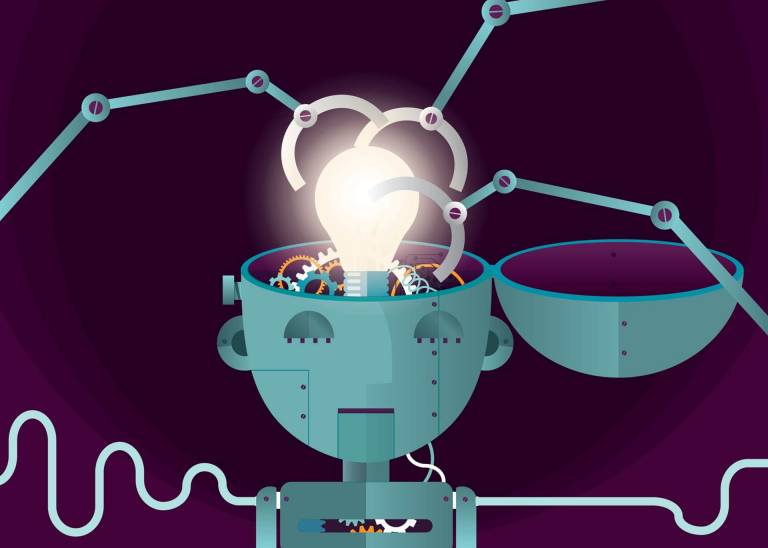According to a Government led commission representing Siemans UK, among other industrial giants, we are on the verge of an artificial intelligence driven Fourth Industrial Revolution that could well create thousands of new manufacturing jobs as well as generate billions for the UK economy if we embrace this new shift through education, training and investment. However, a 2013 University of Oxford study has predicted that 57% of jobs are threatened which “share a predictable pattern of repetitive activities, the likes of which are possible to replicate through Machine Learning algorithms” (Scott, 2017). Those jobs more likely to be protected, according to the University, are considered to “have a level of expertise that is only required after years of study” including a “level of human interaction that may take many more years for computer programmes to replicate.” In short, these are jobs that require “creative and social skills” (Scott, 2017) such as those held by therapists and entrepreneurs, for example. Jobs that are very low-paid and insecure in the zero hour and gig economy are predicted to expand exponentially including losses in the well-paid manufacturing and service sector. What is of more concern is that the University has predicted that there will be a hollowing out of middle class jobs with only high rewards for those at the very top who can display a certain set of of creative, entrepreneurial and emotional intelligence skills. This process, called the “Moravec’s paradox,” discovered by computing experts in the 1980s, will come about because “robots find…difficult things easy and…easy things difficult” (Elliot, 2017). To put it simply, many jobs requiring logic and algebra will be made redundant.
What is more worryingly predicted is that the fall in living standards, particularly for the middle and lower classes, which we have seen since the 1980s with the deregulation and lower taxation of big and multi-national corporations concomitant with the shift to shareholder capitalism, typified by the outsourcing of jobs and the reduction of union power, will continue apace, exacerbated by an artificial intelligence revolution. Some economists believe that the Moravec’s paradox will amplify current developments where “[w]age inflation is going to remain weak…leading to debt-fuelled consumption with all its attendant risks. Interest rates will remain low. Inequality, without a sustained attempt at the redistribution of income, wealth and opportunity, will increase. And so will social tension and political discontent” (Elliot, 2017). The United Nations is so concerned that if society does not adapt quickly enough to new artificial intelligence technologies, it could destabilize the world with mass unemployment and autonomous weapons technology, the latter reminiscent of Terminator’s SkyNet (Boffey, 2017).
Statistically the UK will continue to fall well-behind many of the Nordic countries who currently hold the top positions for living and educational standards: We are currently 21st. Since the 2008 banking crisis, this has exposed those economies in post-industrial decline who have based their economy on a service sector, housing bubble and easy credit. We all know that that losers since the Crash have been angered, though it has been misplaced in some critics’ eyes in the support of populist politics that has managed to shift the blame to easy scapegoats. As a result, some commentators have predicted that global economic power and wealth will be concentrated into a handful of wealthy oligarchs in both business and politics. A Think Tank called Future Advocacy issued a report saying it was “arguably automation – rather than globalisation – that has created the economic and social conditions that led to political shockwaves such as the election of Donald Trump and the vote for Brexit” (Elliot, 2017).
Of late, there has been much discussion by entrepreneurs and politicians that a Universal Basic Income (UBI) is a solution as people will become obsolete in an automated jobs market. Four councils in Scotland are set to create the first pilot scheme in the UK with the motivation that “there has been a groundswell of interest over the past decade not only among lateral thinkers but also anti-poverty groups, which see it as a means of changing the relationship between people and state, and between workers and the gig economy” (Brooks, 2017).
Coupled with the alarming statistics in the growth of poverty and poor living standards from 2008, with the shift away from a welfare state evidenced with the rise of food banks, we are also becoming more aware of a crisis in children and teen mental health. The Good Children Report concluded that children in England are the ‘unhappiest in world’ behind Ethiopia, Algeria and Romania (Weale, 2015). A ChildLine report from 2016 indicated that cyber-bullying and social media is affecting our children’s confidence and self-esteem. We are in the grip of a ticking time-bomb: According to the World Health Organisation (2012) by 2030 mental health conditions will predominate above all other diagnosable physical illnesses. Furthermore, the worrying decline in the mental health of our young is taking place at a time when the education curriculum is been narrowed down to due to an increased focus on English and Maths driven by governmental accountability at the detriment of more creative subjects (Hutchings, 2015). The latter provides vital skills necessary for the UK to meet the challenges of the Fourth Industrial Revolution. As a result, we have to question where exactly is our education system headed considering the mental health crisis in our young, not helped by over-testing, as well as the need to meet many of the challenges highlighted above, such as gross inequality and the most important being upskilling our workforce for a cyber-based economy. The solution that has been posited is a more holistic education system which fosters soft skills such as in the main, empathy. Dr Tania Mathias, acting chairwoman of a cross-party parliamentary Science and Technology Committee suggests that education should “focus on things that machines will be less good at for longer rather than skills that are rapidly becoming obsolete” and these are what make us “uniquely human” otherwise many workers will become “redundant” (Devlin, 2016). Such soft skills that artificial intelligence will not be able to master are: emotional intelligence, creativity, entrepreneurship, teamwork, critical thinking, curiosity and innovative thinking. These are often harder to teach and are more difficult to measure in tests but will also help to buffer our young who will be more resilient to mental health challenges exacerbated by digital social media, and be more employable in a rapidly changing economy where jobs are threatened by automation. Empathy will be required in a future work force to persuade, understand, and respond to the feelings of others to find solutions to a challenging set of problems in an increasingly complex and fast changing world of technology. Furthermore, resilience will be required for our future workers to relearn and adapt to new situations as old skills and jobs become continuously obsolete and where careers will change every few years with the fast pace of developments of the new cyberage. The latter will determine success, behaviour and eventual life outcomes more than any test, exam or qualification. Already a small network of schools in Ireland has currently innovated to meet many of these new challenges: one such is Francis St. School in Dublin which teaches Mindfulness and Yoga to foster empathy, resilience and positive mental health alongside a curriculum that has a strong emphasis on creativity, entrepreneurship and digital technology (Pollak, 2014). The research into Mindfulness has indicated that it positively impacts on social and emotional skills – to help the practitioner be more “calm, resilient, compassionate and empathetic (Weare, 2012). In fact, any contemplation exercise such as meditation, yoga or mindfulness can boost empathy according to the University of California (Kristof, 2015).
So what will your advice be to a young person who mentions that they want to be an accountant or lawyer in the future? I know what mine will be: “Study the arts, digital technology, Mindfulness and/or Yoga. Assimilation? Resistance to where our education system is sadly headed is not futile.”
References
Boffey, D. (2017). Robots could destabilise world through war and unemployment, says UN. [Online] Available at: <https://www.theguardian.com/technology/2017/sep/27/robots-destabilise-world-war-unemployment-un> (Accessed 31st December, 2017)
Brooks, L. (2017). Scotland united in curiosity as councils trial universal basic income. [Online] Available at: <https://www.theguardian.com/uk-news/2017/dec/25/scotland-universal-basic-income-councils-pilot-scheme?CMP=share_btn_link> (Accessed 31st December, 2017)
Devlin, H. (2016) Schools not preparing children to succeed in an AI future, MPs warn. [Online] Available at: <https://www.theguardian.com/technology/2016/oct/12/schools-not-preparing-children-to-succeed-in-an-ai-future-mps-warn> (Accessed 31st December, 2017)
Elliot, L. (2017). Automation will affect one in five jobs across the UK, says study.[Online] Available at: <https://www.theguardian.com/business/2017/oct/16/automation-jobs-uk-robots> (Accessed 31st December, 2017)
Elliot, L. (2017). Robots will not lead to fewer jobs – but the hollowing out of the middle class. [Online] Available at: <https://www.theguardian.com/business/2017/aug/20/robots-are-not-destroying-jobs-but-they-are-hollow-out-the-middle-class> (Accessed 31st December, 2017)
Hutchings, M (2015). Exam factories? The impact of accountability measures on children and young people. [Online] Available at: <https://www.teachers.org.uk/files/exam-factories.pdf> (Accessed 31st December, 2017)
Kristof, N (2015). How do we increase empathy? [Online] Available at: <https://www.nytimes.com/2015/01/29/opinion/nicholas-kristof-how-do-we-increase-empathy.html> (Accessed 31st December, 2017)
Pollak, S. (2014) Empathy, creativity and teamwork – the future of Irish education? [Online] Available at: <https://www.irishtimes.com/news/education/empathy-creativity-and-teamwork-the-future-of-irish-education-1.1968917> (Accessed 31st December, 2017)
Scott. P (2017). These are the jobs most at risk of automation according to Oxford University: Is yours one of them? [Online] Available at: <http://www.telegraph.co.uk/news/2017/09/27/jobs-risk-automation-according-oxford-university-one/> (Accessed 31st December, 2017)
Patrington, R. (2017). UK’s poorest to fare worst in age of automation, thinktank warns. [Online] Available at: <https://www.theguardian.com/technology/2017/dec/28/uks-poorest-to-fare-worst-in-age-of-automation-thinktank-warns> (Accessed 31st December, 2017)
Weale, S. (2015) English Children among the unhappiest in the world at school. [Online] Available at: https://www.theguardian.com/society/2015/aug/19/english-children-among-unhappiest-world-widespread-bullying> (Accessed 31st December, 2017)
Weare, K. (2012). Evidence for the impact of mindfulness on children and young people. [Online] Available at: <https://mindfulnessinschools.org/wp-content/uploads/2013/02/MiSP-Research-Summary-2012.pdf> (Accessed 31st December, 2017)





